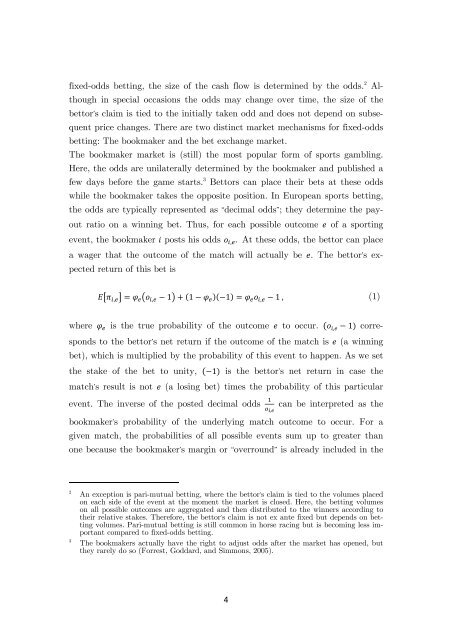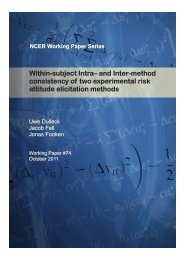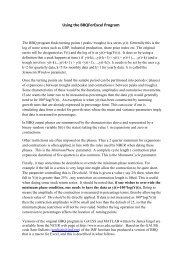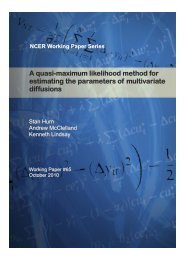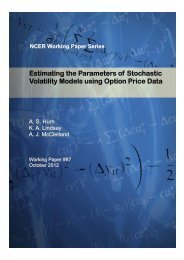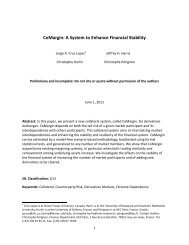Inter-market Arbitrage in Sports Betting - National Centre for ...
Inter-market Arbitrage in Sports Betting - National Centre for ...
Inter-market Arbitrage in Sports Betting - National Centre for ...
Create successful ePaper yourself
Turn your PDF publications into a flip-book with our unique Google optimized e-Paper software.
fixed-odds bett<strong>in</strong>g, the size of the cash flow is determ<strong>in</strong>ed by the odds. 2 Although<br />
<strong>in</strong> special occasions the odds may change over time, the size of the<br />
bettor’s claim is tied to the <strong>in</strong>itially taken odd and does not depend on subsequent<br />
price changes. There are two dist<strong>in</strong>ct <strong>market</strong> mechanisms <strong>for</strong> fixed-odds<br />
bett<strong>in</strong>g: The bookmaker and the bet exchange <strong>market</strong>.<br />
The bookmaker <strong>market</strong> is (still) the most popular <strong>for</strong>m of sports gambl<strong>in</strong>g.<br />
Here, the odds are unilaterally determ<strong>in</strong>ed by the bookmaker and published a<br />
few days be<strong>for</strong>e the game starts. 3 Bettors can place their bets at these odds<br />
while the bookmaker takes the opposite position. In European sports bett<strong>in</strong>g,<br />
the odds are typically represented as “decimal odds”; they determ<strong>in</strong>e the payout<br />
ratio on a w<strong>in</strong>n<strong>in</strong>g bet. Thus, <strong>for</strong> each possible outcome of a sport<strong>in</strong>g<br />
event, the bookmaker posts his odds ,. At these odds, the bettor can place<br />
a wager that the outcome of the match will actually be . The bettor’s expected<br />
return of this bet is<br />
, , 11 1 , 1, (1)<br />
where is the true probability of the outcome to occur. , 1 corre-<br />
sponds to the bettor’s net return if the outcome of the match is (a w<strong>in</strong>n<strong>in</strong>g<br />
bet), which is multiplied by the probability of this event to happen. As we set<br />
the stake of the bet to unity, 1 is the bettor’s net return <strong>in</strong> case the<br />
match’s result is not (a los<strong>in</strong>g bet) times the probability of this particular<br />
event. The <strong>in</strong>verse of the posted decimal odds <br />
can be <strong>in</strong>terpreted as the<br />
bookmaker’s probability of the underly<strong>in</strong>g match outcome to occur. For a<br />
given match, the probabilities of all possible events sum up to greater than<br />
one because the bookmaker’s marg<strong>in</strong> or “overround” is already <strong>in</strong>cluded <strong>in</strong> the<br />
2 An exception is pari-mutual bett<strong>in</strong>g, where the bettor’s claim is tied to the volumes placed<br />
on each side of the event at the moment the <strong>market</strong> is closed. Here, the bett<strong>in</strong>g volumes<br />
on all possible outcomes are aggregated and then distributed to the w<strong>in</strong>ners accord<strong>in</strong>g to<br />
their relative stakes. There<strong>for</strong>e, the bettor’s claim is not ex ante fixed but depends on bett<strong>in</strong>g<br />
volumes. Pari-mutual bett<strong>in</strong>g is still common <strong>in</strong> horse rac<strong>in</strong>g but is becom<strong>in</strong>g less important<br />
compared to fixed-odds bett<strong>in</strong>g.<br />
3 The bookmakers actually have the right to adjust odds after the <strong>market</strong> has opened, but<br />
they rarely do so (Forrest, Goddard, and Simmons, 2005).<br />
4<br />
,


